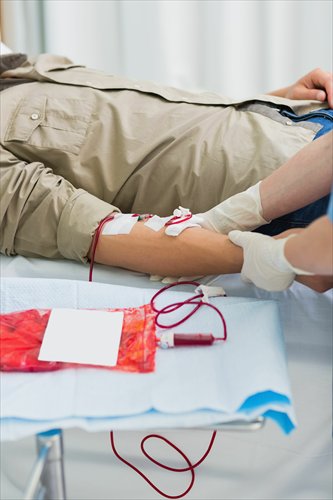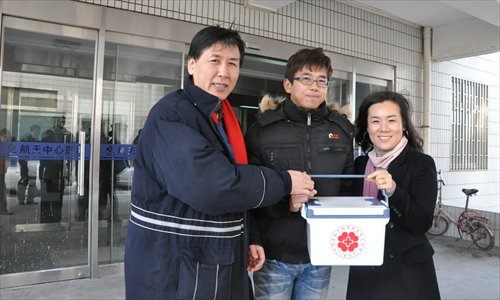The gift of life
The China Marrow Donor Program saves numerous lives here and abroad, but more volunteers are needed

For some cancer and autoimmune disease patients, a bone marrow transplant is the only hope of survival. Photo: IC
Zhang Bao, 34, was completely caught out when he received the call asking if he would be willing to donate marrow to an anonymous stranger in South Korea.
It was all the way back in 2002 when he registered at a blood bank in Wuhan, Hubei Province to be a potential marrow donor under the China Marrow Donor Program (CMDP) run by the Red Cross Society of China.
The program is a stem cell data bank, matching potential donors with cancer and autoimmune disease patients whose chance of survival is the transplant of stem cells found in the bone marrow.
"When I got the call from the CMDP almost six years after signing up, I had almost forgotten about it," Zhang recalls.
The transplant requires patient and donor to have matching tissue type, which can be a major challenge. The procedure itself is low-risk for the donor, generally carrying no long-term ill effects, with the donor's marrow replacing itself.
Nevertheless, the thought of surgery worried Zhang. His parents objected vehemently to the transplant, fearing that something could go wrong. While Zhang was still pondering his decision, in March 2009, he was involved in a life-threatening traffic accident.
"I was in hospital for half a month. My family used the accident to try to convince me to give up the idea of donating marrow," he said. "But because of this accident, I became determined to donate. I was so close to death, which made me more appreciative of the preciousness of life."
Zhang successfully underwent the procedure to extract stem cells from his body in January 2010. There are rules preventing patients and donors from seeking each other out, but Zhang said that he was told the South Korean recipient, a patient with leukemia, was recovering well.
Zhang's act of generosity did not go unnoticed. During a State visit to Seoul National University last July, Chinese President Xi Jinping mentioned Zhang's story as an example of the two nations' friendship, according to China Today magazine. Zhang is one of 45 Chinese nationals who have donated bone marrow to patients in South Korea in recent years.
"I'm so honored to hear President Xi Jinping's remarks. I heard about it from others," said Zhang. "I was just doing my duty."
Marrow donation has received further attention in China since January, when the BBC ran a story about a Chinese driver in Shanghai, Jiang Yongfeng, whose stem cells were matched to a 7-year-old boy in the UK.
In the wake of such heartwarming stories, Gao Dongying, deputy director of the CMDP, told Metropolitan that more donors were needed.
According to the BBC report, only 4 percent of people on the global stem cell registry are of Chinese origin, although Chinese people make up around 20 percent of the world's population.

Zhang Bao (middle) poses with representatives from the CMDP (left) and the Korea Marrow Donation Program. Photo: Courtesy of the CMDP
Pain-free procedure
Gao said that transnational stem cell matches were quite rare, given that a match most of the time requires that patient and donor are of the same ethnicity.
"There are 2.01 million volunteers in the CMDP database," said Gao. Over the past decade or so, we've successfully matched more than 4,700 patients with donors, of which 189 were for patients outside of the Chinese mainland."
Gao stressed that the procedure for transplanting stem cells from one person to another was almost pain-free, and that there were no negative effects from donating stem cells.
There are two procedures for extracting stem cells from a donor. The first is through blood transfusion, and the second through a surgical procedure in which the cells are withdrawn by a needle from the donor's pelvic bone.
Zhang underwent the first type of procedure. Prior to the procedure, Zhang had to undergo a series of injections to "activate" the stem cells in a hospital in Beijing.
"It wasn't painful, but my waist was a little sore [from the injections]," he said.
After five days of injections, Zhang was hooked up to a blood transfusion machine for around five hours.
"At first, I was conscious. After a while, I felt quite tired, so I fell asleep," said Zhang. "When I woke up again, the procedure was already over."
"My first reaction was relief that I had done the right thing."
Resistance to donation
Gao said that although stem cell transplants were a relatively risk-free procedure, many in China were still reluctant to register as donors, particularly older generations.
She said that about 70 percent of those on the CMDP's registry were between 18 and 35. "The majority of potential donors are young people. We need more support from older people," said Gao.
Gao said that many middle-aged and elderly Chinese people try to prevent their younger relatives from being potential marrow donors.
"There are numerous cases of parents, grandparents or other relatives opposing donation," said Gao. "Sometimes, a donor's grandparents have even said that they would disown the donor if he or she goes through with the operation."
Gao said that the reason that older family members frequently objected to marrow donation was because they did not understand the procedure, and found it difficult to let go of traditional biases. Gao said that there was a traditional Chinese way of thinking that a person's body came from their parents, so it was difficult for young people who wanted to donate to go against their parents wishes.
"We don't require parents' approval for a donation, but we always suggest that donors get permission from their families," said Gao. "[But] a lot of older people can't accept it. There's a knowledge gap."
Gao said that in some cases, the CMDP would organize meetings between the families of potential donors and donors who had already gone through the procedure to allay their fears.
Zhang Yi, a 25-year-old who works in construction, was one such donor who needed to persuade his parents to allow him to go through with the procedure.
Zhang Yi signed up to the CMDP registry in 2008, as a student at Tianjin University.
"I joined up along with the rest of my classmates," said Zhang Yi. "But at the time, I didn't know much about it."
In early 2013, Zhang Yi was contacted by the CMDP. They had found a match for him in a patient suffering from follicular lymphoma in Denmark. Unusually, the patient was Caucasian, which would make Zhang Yi the first Chinese person to donate stem cells to a white person, if he decided to go through with the procedure.
"My parents were worried," said Zhang Yi. For three days, Zhang Yi and his parents had intense discussions about whether he should donate or not. In addition to the information they received from the CMDP, they consulted local doctors and read up about the procedures online.
"I was told that the method they would be using [blood transfusion] is generally safe," said Zhang Yi. "And that the stem cells they would extract would regenerate themselves."
Zhang Yi underwent marrow transplant in August 2013, with his parents' consent.
More needs to be done
"We still need more publicity and to draw more attention to stem cell donation," said Gao. "And for those who have already joined the CMDP, they should keep themselves healthy in case that they will be needed one day."
As part of the CMDP's efforts to generate more support for their cause, Zhang Yi routinely takes to the street with a team of 50 other volunteers to distribute pamphlets about marrow donation. He also hosted public events, and made speeches based on his own experience, in an effort to encourage more people to sign up to the CMDP's registry.
"I heard from the local government [in Huainan] that the percentage of people donating blood and registering with the CMDP is increasing," said Zhang Yi. "I will continue to do what I am doing."
Both Zhang Yi and Zhang Bao said that they would be happy to donate again if called upon.